初中英语八大时态复习
初中英语语法八大时态总结(完整版)
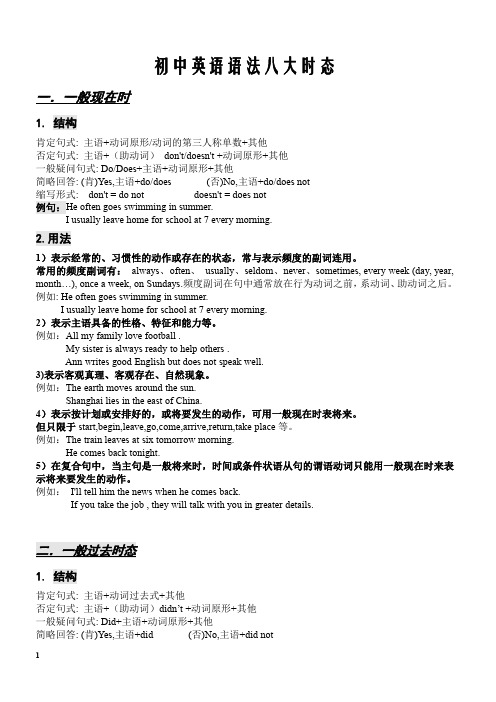
初中英语语法八大时态一.一般现在时1.结构肯定句式:主语+动词原形/动词的第三人称单数+其他否定句式:主语+(助动词)don't/doesn't+动词原形+其他一般疑问句式:Do/Does+主语+动词原形+其他简略回答:(肯)Yes,主语+do/does(否)No,主语+do/does not缩写形式:don't=do not doesn't=does not例句:He often goes swimming in summer.I usually leave home for school at7every morning.2.用法1)表示经常的、习惯性的动作或存在的状态,常与表示频度的副词连用。
常用的频度副词有:always、often、usually、seldom、never、sometimes,every week(day,year, month…),once a week,on Sundays.频度副词在句中通常放在行为动词之前,系动词、助动词之后。
例如:He often goes swimming in summer.I usually leave home for school at7every morning.2)表示主语具备的性格、特征和能力等。
例如:All my family love football.My sister is always ready to help others.Ann writes good English but does not speak well.3)表示客观真理、客观存在、自然现象。
例如:The earth moves around the sun.Shanghai lies in the east of China.4)表示按计划或安排好的,或将要发生的动作,可用一般现在时表将来。
但只限于start,begin,leave,go,come,arrive,return,take place等。
初中英语语法八大时态总结(完整版)
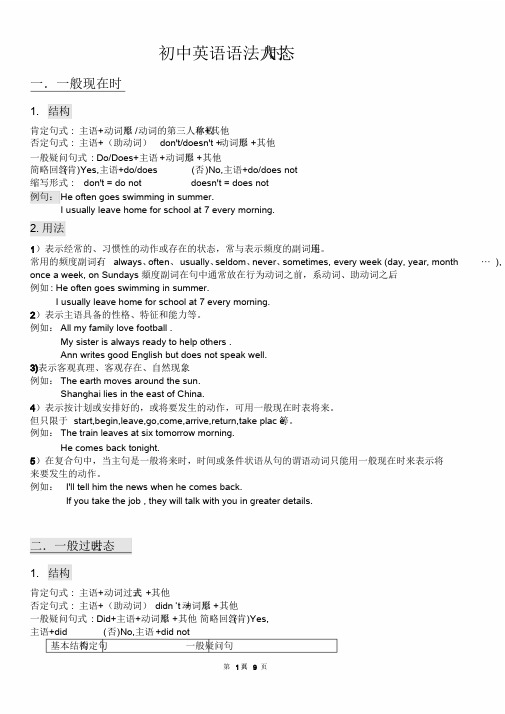
初中英语语法八大时态一.一般现在时1. 结构+其他单数肯定句式: 主语+动词原形/动词的第三人称否定句式: 主语+(助动词)don't/doesn't +动词原形+其他一般疑问句式: Do/Does+主语+动词原形+其他: (肯)Yes,主语+do/does (否)No,主语+do/does not简略回答缩写形式: don't = do not doesn't = does not例句:He often goes swimming in summer.I usually leave home for school at 7 every morning.2. 用法1)表示经常的、习惯性的动作或存在的状态,常与表示频度的副词连用。
:always、often、usually、seldom、never、sometimes, every week (day, year, month ⋯), 常用的频度副词有once a week, on Sundays频. 度副词在句中通常放在行为动词之前,系动词、助动词之后。
例如: He often goes swimming in summer.I usually leave home for school at 7 every morning.2)表示主语具备的性格、特征和能力等。
例如:All my family love football .My sister is always ready to help others .Ann writes good English but does not speak well.3)表示客观真理、客观存在、自然现象。
例如:The earth moves around the sun.Shanghai lies in the east of China.4)表示按计划或安排好的,或将要发生的动作,可用一般现在时表将来。
初中英语8个时态归纳总结
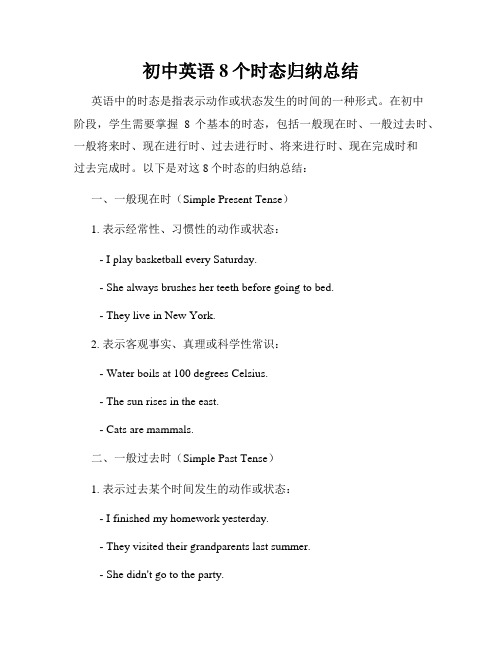
初中英语8个时态归纳总结英语中的时态是指表示动作或状态发生的时间的一种形式。
在初中阶段,学生需要掌握8个基本的时态,包括一般现在时、一般过去时、一般将来时、现在进行时、过去进行时、将来进行时、现在完成时和过去完成时。
以下是对这8个时态的归纳总结:一、一般现在时(Simple Present Tense)1. 表示经常性、习惯性的动作或状态:- I play basketball every Saturday.- She always brushes her teeth before going to bed.- They live in New York.2. 表示客观事实、真理或科学性常识:- Water boils at 100 degrees Celsius.- The sun rises in the east.- Cats are mammals.二、一般过去时(Simple Past Tense)1. 表示过去某个时间发生的动作或状态:- I finished my homework yesterday.- They visited their grandparents last summer.- She didn't go to the party.2. 表示过去的经历或习惯:- When I was young, I often went swimming. - He always ate breakfast at 8 o'clock.三、一般将来时(Simple Future Tense)1. 表示将来要发生的动作或事件:- I will go shopping tomorrow.- They are going to have a picnic next week. - She won't be late for the meeting.2. 表示将来的打算或意愿:- I am going to be a doctor when I grow up.- We will help you with your project.四、现在进行时(Present Continuous Tense)1. 表示现在正在进行的动作:- We are studying English at the moment.- He is playing soccer with his friends.- They aren't watching TV right now.2. 表示现阶段的趋势或变化:- The population is increasing rapidly.- More and more people are using smartphones.五、过去进行时(Past Continuous Tense)1. 表示过去某一时间段内正在进行的动作:- I was reading a book when the phone rang.- They were cooking dinner at 7 o'clock.2. 表示过去的同时发生的两个动作:- She was listening to music while doing her homework.六、将来进行时(Future Continuous Tense)1. 表示将来某一时间段内正在进行的动作:- Tomorrow, they will be flying to Paris.- I will be waiting for you at the station.2. 表示将来的预测或计划:- This time next month, I will be studying for my exams.七、现在完成时(Present Perfect Tense)1. 表示过去某一时间发生的动作对现在造成的影响或结果: - I have finished my homework, so I can watch TV now.- She has already eaten lunch.2. 表示过去某一时间内多次发生的动作:- We have visited that museum several times.八、过去完成时(Past Perfect Tense)1. 表示过去某一时间点之前已经完成的动作:- By the time they arrived, we had already left.- I had finished my work before the deadline.2. 表示过去的顺序或先后关系:- She realized that she had forgotten her keys after she locked the door.以上是初中英语的8个时态的归纳总结。
初中英语语法八大时态总结(完整版)
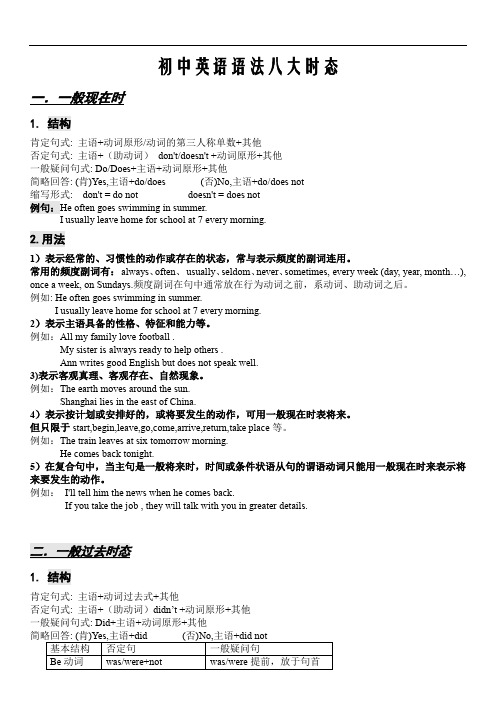
初中英语语法八大时态一.一般现在时1.结构肯定句式: 主语+动词原形/动词的第三人称单数+其他否定句式: 主语+(助动词)don't/doesn't +动词原形+其他一般疑问句式: Do/Does+主语+动词原形+其他简略回答: (肯)Yes,主语+do/does (否)No,主语+do/does not缩写形式: don't = do not doesn't = does not例句:He often goes swimming in summer.I usually leave home for school at 7 every morning.2.用法1)表示经常的、习惯性的动作或存在的状态,常与表示频度的副词连用。
常用的频度副词有:always、often、usually、seldom、never、sometimes, every week (day, year, month…), once a week, on Sundays.频度副词在句中通常放在行为动词之前,系动词、助动词之后。
例如: He often goes swimming in summer.I usually leave home for school at 7 every morning.2)表示主语具备的性格、特征和能力等。
例如:All my family love football .My sister is always ready to help others .Ann writes good English but does not speak well.3)表示客观真理、客观存在、自然现象。
例如:The earth moves around the sun.Shanghai lies in the east of China.4)表示按计划或安排好的,或将要发生的动作,可用一般现在时表将来。
中考英语八种时态归纳复习
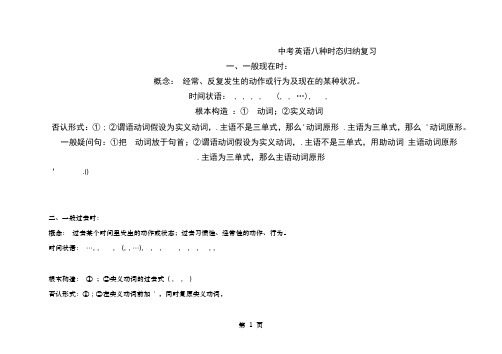
中考英语八种时态归纳复习一、一般现在时:概念:经常、反复发生的动作或行为及现在的某种状况。
时间状语:, , , , (, , …), ,根本构造:① 动词;②实义动词否认形式:① ; ②谓语动词假设为实义动词,.主语不是三单式,那么'动词原形 .主语为三单式,那么 '动词原形。
一般疑问句:①把动词放于句首;②谓语动词假设为实义动词,.主语不是三单式,用助动词主语动词原形.主语为三单式,那么主语动词原形’ .()二、一般过去时:概念:过去某个时间里发生的动作或状态;过去习惯性、经常性的动作、行为。
时间状语:…, , , (, , …), , , , , , , ,根本构造:① ;②实义动词的过去式( , , )否认形式:① ; ②在实义动词前加' ,同时复原实义动词,即’动词原形一般疑问句:① 或放于句首;②用助动词的过去式提问,同时复原实义动词。
.() .()三、现在进展时:概念:表示现阶段或说话时正在进展的动作及行为。
时间状语:, , , ,根本构造:否认形式: .一般疑问句:把动词放于句首。
, .()四、过去进展时:概念:表示过去某段时间或某一时刻正在发生或进展的行为或动作。
时间状语:, , ,或以引导的谓语动词是一般过去时的时间状语等。
根本构造:否认形式: .一般疑问句:把或放于句首。
.().()五、现在完成时:概念:过去发生或已经完成的动作对现在造成的影响或结果,或从过去已经开场,持续到现在的动作或状态。
时间状语:…… , , , , , (几年来,这么多年来),主〔现完〕从〔一过〕〔注意与的区别〕,根本构造:否认形式: .一般疑问句:或主语.()六、过去完成时:概念:以过去某个时间为标准,在此以前发生的动作或行为,或在过去某动作之前完成的行为,即“过去的过去〞。
时间状语:(, …) 过去的时间,主(过完)从(一过)根本构造: . 否认形式: .一般疑问句:放于句首。
初中英语语法八大时态总结(附答案)
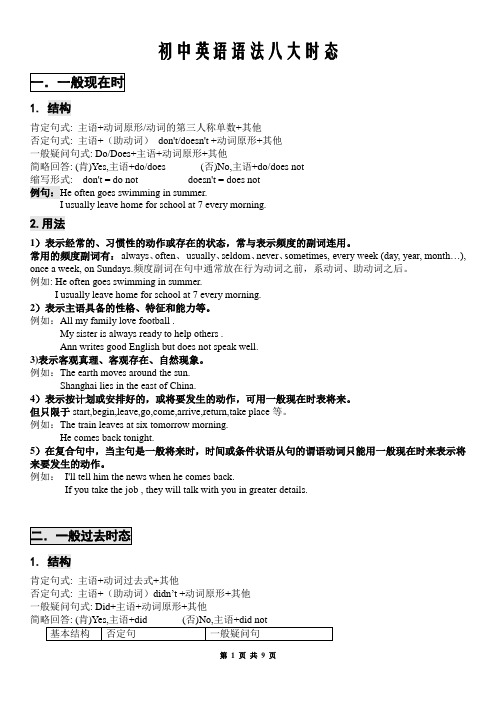
初中英语语法八大时态1.结构肯定句式: 主语+动词原形/动词的第三人称单数+其他否定句式: 主语+(助动词)don't/doesn't +动词原形+其他一般疑问句式: Do/Does+主语+动词原形+其他简略回答: (肯)Yes,主语+do/does (否)No,主语+do/does not缩写形式: don't = do not doesn't = does not例句:He often goes swimming in summer.I usually leave home for school at 7 every morning.2.用法1)表示经常的、习惯性的动作或存在的状态,常与表示频度的副词连用。
常用的频度副词有:always、often、usually、seldom、never、sometimes, every week (day, year, month…), once a week, on Sundays.频度副词在句中通常放在行为动词之前,系动词、助动词之后。
例如: He often goes swimming in summer.I usually leave home for school at 7 every morning.2)表示主语具备的性格、特征和能力等。
例如:All my family love football .My sister is always ready to help others .Ann writes good English but does not speak well.3)表示客观真理、客观存在、自然现象。
例如:The earth moves around the sun.Shanghai lies in the east of China.4)表示按计划或安排好的,或将要发生的动作,可用一般现在时表将来。
初中英语语法八大时态总结完整版
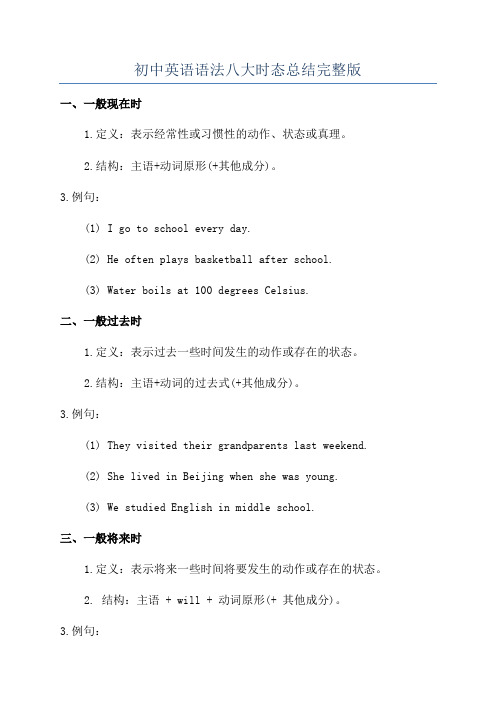
初中英语语法八大时态总结完整版一、一般现在时1.定义:表示经常性或习惯性的动作、状态或真理。
2.结构:主语+动词原形(+其他成分)。
3.例句:(1) I go to school every day.(2) He often plays basketball after school.(3) Water boils at 100 degrees Celsius.二、一般过去时1.定义:表示过去一些时间发生的动作或存在的状态。
2.结构:主语+动词的过去式(+其他成分)。
3.例句:(1) They visited their grandparents last weekend.(2) She lived in Beijing when she was young.(3) We studied English in middle school.三、一般将来时1.定义:表示将来一些时间将要发生的动作或存在的状态。
2. 结构:主语 + will + 动词原形(+ 其他成分)。
3.例句:(1) I will go to the park tomorrow.(3) We will have a party next week.四、现在进行时1.定义:表示现在正在进行的动作。
2. 结构:主语 + am/is/are + 动词-ing(+ 其他成分)。
3.例句:(1) She is reading a book right now.(2) They are playing soccer in the park.(3) We are having dinner at the moment.五、过去进行时1.定义:表示过去一些时间正在进行的动作。
2. 结构:主语 + was/were + 动词-ing(+ 其他成分)。
3.例句:(1) He was watching TV at 8 o'clock last night.(2) They were traveling in Europe during summer vacation.(3) We were studying when the phone rang.六、将来进行时1.定义:表示将来一些时间正在进行的动作。
初中英语语法八大时态总结(完整版)

初中英语语法八大时态一.一般现在时1.结构肯定句式: 主语+动词原形/动词的第三人称单数+其他否定句式: 主语+(助动词)don't/doesn't +动词原形+其他一般疑问句式: Do/Does+主语+动词原形+其他简略回答: (肯)Yes,主语+do/does (否)No,主语+do/does not缩写形式: don't = do not doesn't = does not例句:He often goes swimming in summer.I usually leave home for school at 7 every morning.2.用法1)表示经常的、习惯性的动作或存在的状态,常与表示频度的副词连用。
常用的频度副词有:always、often、usually、seldom、never、sometimes, every week (day, year, month…), once a week, on Sundays.频度副词在句中通常放在行为动词之前,系动词、助动词之后。
例如: He often goes swimming in summer.I usually leave home for school at 7 every morning.2)表示主语具备的性格、特征和能力等。
例如:All my family love football .My sister is always ready to help others .Ann writes good English but does not speak well.3)表示客观真理、客观存在、自然现象。
例如:The earth moves around the sun.Shanghai lies in the east of China.4)表示按计划或安排好的,或将要发生的动作,可用一般现在时表将来。
- 1、下载文档前请自行甄别文档内容的完整性,平台不提供额外的编辑、内容补充、找答案等附加服务。
- 2、"仅部分预览"的文档,不可在线预览部分如存在完整性等问题,可反馈申请退款(可完整预览的文档不适用该条件!)。
- 3、如文档侵犯您的权益,请联系客服反馈,我们会尽快为您处理(人工客服工作时间:9:00-18:30)。
happen 9. ________ the story __________ (happen) in Did London in 1940? doing 10. What _____________ he _____________ (do) was when his mother opened the door? 11. If it (not rain) tomorrow, they will go (go) fishing.doesn’t rain play 12. Does Kate _____ (play) the piano every Sunday? ____ 13. They (not call) you the day after won’t call tomorrow. has worked 14. Tom ______ (work) there since two years ago. arrived 15. By the time I ________ (arrive), the teacher __________ (start) teaching. had started
1.He often helps the old woman to carry(carry) water. _______ 2. I saw her cooking _______(cook) when I got home. 3.Don’t forget ________(turn) off the lights before you go out. to turn 4.Please let the girls go _____(go) first. 5.They had great fun playing ________(play) football this afternoon. watching 6.Do you enjoy ________(watch) TV? 7.Would you like to have ______(have) a cup of tea? go 8.You can ______(go) there tomorrow. 9.Would you mind my opening _____(open) the door? 10.Please ask himnot to speak speak) more loudly ____ ___(not 11.The teacher stopped_______(talk) to us when we went in. talking 12.Thanks forhelping _______(help) me with my English.
过去进行时:
概念: 表示过去正在发生的动作
结构: be (was,were) + doing 标志语:at 8:00 yesterday 、
when、 while、…
1)Mary ___ a dress when she watched TV. C A. made B. is making C. was making D. makes 2) While she ___ the newspaper, Granny ___ asleep. B A. read; was falling B. was reading; fell C. was reading; was falling D. read;fell
going asking writing taking getting running swimming
1.The twins are washing ___________(wash) the clothes now. 2.Look! He is playing(play) basketball ________ over there. singing is 3.Listen! ______ Sally _______(sing)?
How often do you …? (once a week, twice…, never)
一般现在时:
概念: 表示习惯、经常性的动作
结构: do、 does 标志语:usually、often、never、
sometimes、once a week、 twice a month、every year
No, I haven’t …
现在完成时:
概念: 表示已经发生的动作,对现 在造成的影响。 结构: has done、 have done 标志语:already、 yet、ever、 before 、 never 、 、since…、 for…、
have washed 1.The twins ___________(wash) the
was (be)fine the next day, 3.He said if it
he skating.(go)
would go
pack the towels √ pack the camera X water the plants √ … … -- Have you packed … yet? -- Yes, I have packed ….
washed 1.The twins ___________(wash) the clothes yesterday. 2.The day before yesterday he played ________ (play) basketball over there. sing Did 3._____ Sally ______(sing) two hours ago?
morning afternoon night
-- I will ….
Will go… Will visit… …
-- What will you do next morning?
一般将来时:
概念: 表示将要发生的动作
结构: will do、 shall do、
be (is、am、are) going to do
------时 态
Lily
Lucy
现在进行时:
概念: 表示现在正在发生的动作 结构: be (is, am, are) + doing 标志语: Look! 、 Listen! 、now
、at the moment
动词-ing形式的构成: 一般在动词原形后 go +ing ask write 以不发音的e结尾 的,去e,+ing take 重读闭音节以一个 get 辅音字母结尾的, run 双写这一字母+ing swim
过去将来时:
概念: 表示过去将要发生的动作
结构: would do
be (was、were) going to do
标志语:常用于主句是一般过去 时的宾语从句中
1.He said he
would come
the next day.(come)
would see afternoon.(see) 2.He told me she him that
标志语:tomorrow、in..、next…
will rain ( rain ) 1.I don't think that it ______
tomorrow. 2.There _________ ( be ) a meeting will be next Monday. 3. They _______ ( have ) an English will have evening next week.
1.I usuallyget (get) up at 6:00, but yesterday I got (get) up at 7:00, and tomorrow Iwill get (get) up at 6:30. 2. Listen! Someone is knocking (knock) at the door. have been 3. I _________(be)in Beijing for two years. surf does 4. How often _______________ Andy ________ (surf) the Internet? was reading a book. 5. He fell asleep while he ________(read) have heard 6. I _____ never _______ (hear) of that man before. went 7. My brother often ________ (go) for walks last summer. would put (put) on the new 8. Lily said that she dress the next day.
动词-s形式的构成:
在动词后加-s
以字母s; sh; ch; x; o 结尾的动词,+es “ 辅音字母+y ” , 变y 为i, 再+es
want answer watch go carry cry
wants answers watches goes carries cries
wash 1.The twins ___________(wash) the clothes every day. plays 2.Sometimes he ________ (play) basketball over there. sing 3.How often does Sally ______(sing)? ____
动词-ed形式的构成: want 在动词后加-ed
answer 以字母e 结尾的动 move 词,只+d die “ 辅音字母+y ” , carry 变y 为i, 再+ed cry 重读闭音节以一个 stop 辅音字母结尾的, plan 双写+ed
